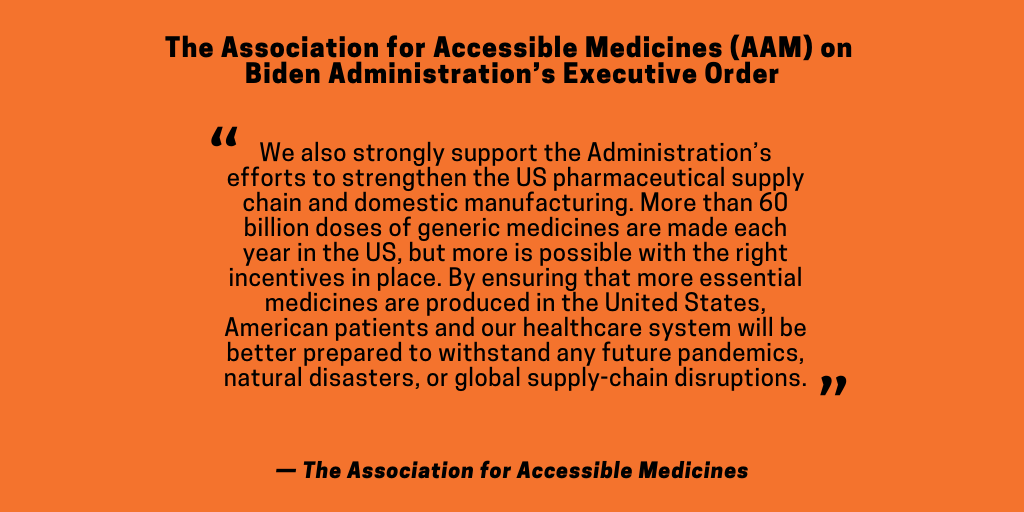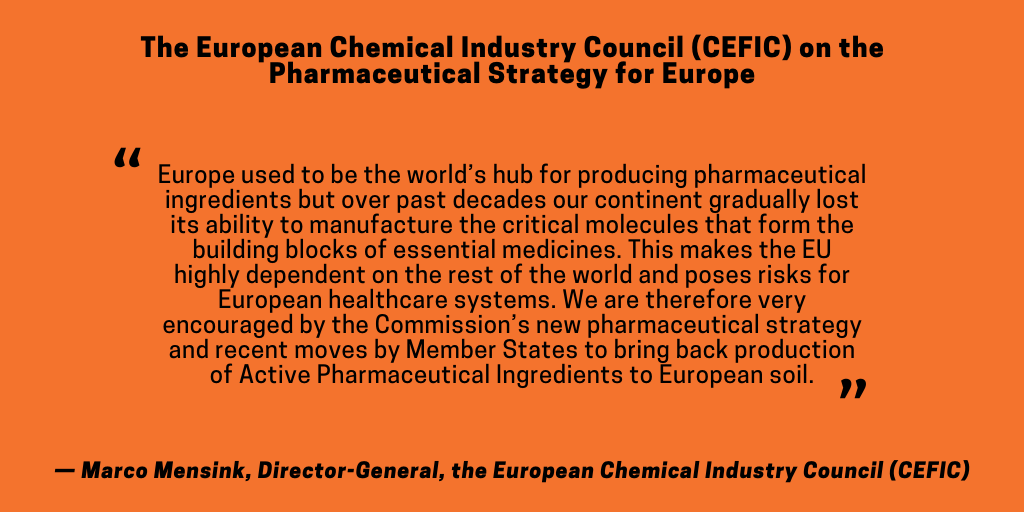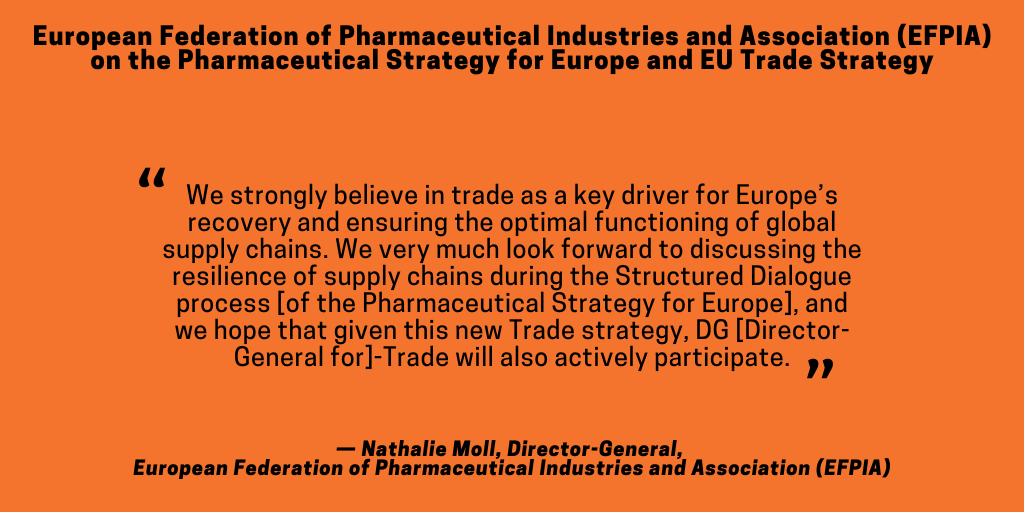The Pharma Pulse: Re-shoring Drug Manufacturing
Reshoring manufacturing, including drug manufacturing, has gained policy momentum in the US and EU stemming in part from supply-chain vulnerabilities exposed during the COVID-19 pandemic. But will that momentum continue, and how would such policies take shape? DCAT Value Chain Insights gains industry feedback.
Policy moves for increasing US-based manufacturing
President Joe Biden issued an executive order in late January (January 2021) to strengthen certain requirements that goods, materials, and products purchased by the US federal government be manufactured in the US. The US government spends approximately $600 billion annually in purchasing, and the measures are intended to increase US-based manufacturing as part of an overall economic recovery and investment plan and a way to further reduce supply-chain vulnerabilities for critical goods. The executive order applies only to federal procurement of goods, materials, and products, so for the pharmaceutical industry, the direct impact thus far would apply only to those products purchased by federal agencies of the US government. The yet-to-be seen implications would be to further define the Administration’s policy for its goal of strengthening supply chains for essential products and supplies overall and specifically what that may mean for the pharma industry.

Under the previous Administration, there were several executive orders to increase US-based drug manufacturing for essential drugs, and it is still to be seen how the current Administration will define its policy as it relates to increasing US-based drug manufacturing specifically and its scope. In 2020, President Donald Trump issued an executive order that set forth the policy goals and authorization by certain federal departments and agencies, including the US Department of Health and Human Services and the US Food and Drug Administration, to increase US-based production and federal procurement of essential medicines, medical countermeasures, and critical inputs and to limit federal procurement for such products to be made in the US. The HHS/FDA was charged to identify a list of essential medicines, medical countermeasures, and critical inputs (inclusive of active pharmaceutical ingredients [APIs]) that are medically necessary to have available at all times in an amount adequate to serve patient needs and in the appropriate dosage forms. The FDA issued such a list, subject to public comment, compromised of 223 drugs and biological products, primarily generic drugs. What measures the Biden Administration may take or not as it specifically relates to pharmaceuticals and US-based drug manufacturing is a key policy issue to watch for 2021. The Biden Administration’s executive order for overall federal procurement of goods, materials, and products and US-based manufacturing requirements was its first policy move in this area.
Increasing drug manufacturing in the EU
A reduction of reliance on offshore drug manufacturing is on the policy table in the European Union (EU) as part of the European Commission’s Pharmaceutical Strategy for Europe, which the European Commission (EC) adopted in late November (November 2020). It includes a plan for initiating a structured dialogue with and between stakeholders in pharmaceutical manufacturing and public authorities to identify vulnerabilities in the supply chain of critical medicines and shape policy options to strengthen the continuity and security of supply in the EU.
The European Commission’s approval of its Pharmaceutical Strategy for Europe marks the beginning of a process. Its implementation includes an agenda of legislative and non-legislative actions that will be launched over the coming years, of which reducing offshore dependence of medicines and pharmaceutical ingredients is just one measure of a comprehensive strategy for pharmaceuticals for the EU. The implementation of the strategy has begun and will include a proposal for revision of EU pharmaceutical legislation in 2022. To that end, the European Commission issued a Communication on the Pharmaceutical Strategy for Europe in November (November 25, 2020) to the European Parliament, the European Council, the European Economic and Social Committee (EESC), and the European Committee of the Regions (CoR). The European Council consists of heads of state or government of EU countries, the President of the European Council, and the President of the European Commission. The EESC is an advisory body representing employers’ and workers’ organizations and other interest groups. The CoR is an advisory body representing regional and local authorities in the EU.

The EU’s Pharmaceutical Strategy seeks to secure the supply of medicines across the EU and avoid shortages and build on the European Council’s goal of “open strategic autonomy” for the EU in the area of medicines. This involves identifying areas of dependence, including the reliance of the EU on offshore sources of pharmaceutical ingredients, including APIs, in order to reduce supply-chain vulnerabilities by diversifying production and supply chains, ensuring strategic stockpiling, as well as fostering production and investment in Europe. In its November 25, 2020 Communication to EU bodies on the EU’s Pharmaceutical Strategy, the European Commission emphasized that the COVID-19 pandemic further underscored the complexity of the pharmaceutical supply chain, including the EU’s dependence on raw materials, intermediates, and APIs from sources outside the EU, a concern that pre-dated the pandemic.
In addition to the Pharmaceutical Strategy for Europe, the EC adopted earlier this month (February 2021) its Trade Strategy for Europe, which underscores the importance of global cooperation and well-functioning global supply chains, particularly in light of the COVID-19 pandemic.
Industry feedback
Industry feedback to date has been supportive of increasing domestic manufacturing from generic-drug groups in the US and chemical manufacturers in the EU. Such feedback is outlined below.
Association for Accessible Medicines. The Association for Accessible Medicines (AAM), which represents generic and biosimilar developers and manufacturers, offered support for the Biden Administration’s policy. “We also strongly support the Administration’s efforts to strengthen the US pharmaceutical supply chain and domestic manufacturing,” said the AAM in a January 21, 2021 statement. “More than 60 billion doses of generic medicines are made each year in the U.S., but more is possible with the right incentives in place. By ensuring that more essential medicines are produced in the United States, American patients and our healthcare system will be better prepared to withstand any future pandemics, natural disasters, or global supply-chain disruptions.” In April 2020, the AAM issued its proposal for re-shoring drug manufacturing of designated essential medicines in the US through various measures, such as providing tax incentives, grants, and volume guarantees to incentivize drug manufacturers and make re-shoring drug manufacturing economically feasible.
The European Chemical Industry Council (CEFIC). The European Chemical Industry Council (CEFIC), which represents chemical manufacturers in Europe, is supportive of measures to increase drug manufacturing in Europe and reduce the EU’s dependence on non-EU sources of pharmaceutical ingredients. “Europe used to be the world’s hub for producing pharmaceutical ingredients, but over past decades, our continent gradually lost its ability to manufacture the critical molecules that form the building blocks of essential medicines,” said Marco Mensink, Director-General, CEFIC, in commenting on the adoption of the EU’s Pharmaceutical Strategy in late November (November 2020). “This makes the EU highly dependent on the rest of the world and poses risks for European healthcare systems. We are therefore very encouraged by the Commission’s new pharmaceutical strategy and recent moves by Member States to bring back production of Active Pharmaceutical Ingredients to European soil.”

European Federation of Pharmaceutical Industries and Associations (EFPIA). The European Federation of Pharmaceutical Industries and Associations (EFPIA), which represents innovator, research-based pharmaceutical companies and national regulatory associations in Europe, supports the structured dialogue for evaluating the EU’s supply chains as part of the process outlined in the Pharmaceutical Strategy for Europe and in the EU Trade Strategy although it did specifically address proposals for onshoring manufacturing. “We strongly believe in trade as a key driver for Europe’s recovery and ensuring the optimal functioning of global supply chains,” said Nathalie Moll, Director-General, EFPIA in a February 21, 2021 statement. “We very much look forward to discussing the resilience of supply chains during the Structured Dialogue process [of the Pharmaceutical Strategy for Europe], and we hope that given this new Trade strategy, DG [Director-General for]-Trade will also actively participate.”





